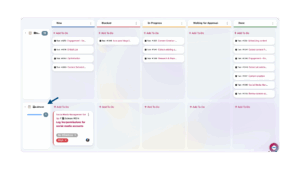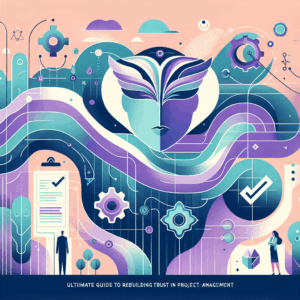Estimated reading time: 20 minutes
In today’s rapidly evolving workplace, embracing neurodiversity has emerged as a powerful strategy to enhance productivity and foster a more inclusive environment. By embracing neurodiversity, we give recognition to and accept the neurological differences in individuals, including conditions such as autism, ADHD, dyslexia, and others.
In this article, we’ll uncover the unique strengths and perspectives that neurodiverse individuals bring to the table and how embracing this diversity can elevate workplace productivity.
Keep reading to discover the benefits and strategies to create an inclusive and thriving work environment that embraces the richness of neurodiversity.
Table of Contents
- What is Neurodiversity?
- Understanding Neurodivergent Conditions
- Benefits of Neurodiversity in the Workplace
- Accommodations for Neurodiverse Employees
- Navigating Neurodiversity in Remote Work
- Strategies for Building a Neurodivergent Workforce
- Challenges and Solutions in Managing a Neurodiverse Workforce
- Leantime: Supporting Neurodiversity in the Workplace
- Unlocking Neurodiverse Potential
What is Neurodiversity?
Neurodiversity refers to the natural variations in human cognition, encompassing differences in how people think, learn, and process information. It recognizes the diverse strengths and challenges of individuals with neurodivergent conditions such as autism, ADHD, dyslexia, and others. It also incorporates empathy in order to make room for how others and even ourselves think and view the world.
Did You Know: According to research, around 15-20% of the population in the United States is neurodivergent. [1]
Creating an inclusive and supportive work environment for neurodiverse employees fosters innovation, creativity, and critical thinking. Companies that embrace it can benefit from an expanded talent pool, diverse skill sets, and enhanced reputation, ultimately leading to improved productivity and performance.
Understanding Neurodivergent Conditions
Conditions include autism, ADHD, dyslexia, dyspraxia, and others, with each individual displaying unique strengths and challenges. Understanding and supporting neurodiversity in the workplace involves more than just recognizing but also accommodating these differences, fostering a more inclusive and supportive work environment for all employees.
Benefits of Neurodiversity in the Workplace
Supporting neurodiversity in the workplace offers numerous advantages for both employees and organizations. When an organization creates a psychologically safe environment for the varying ways that our brains work, businesses can unlock the full potential of their workforce and achieve a competitive edge.
Read More: Addressing ADHD Challenges in the Workplace
Embracing Creativity
They have unique ways of approaching tasks and projects that differ from their colleagues. This can lead to innovative and creative outcomes that can help organizations remain competitive by developing new products, services, or strategies. One of the significant advantages of promoting neurodiversity in the workplace is an increase in creativity.
They often have unique ways of thinking that can lead to creative ideas and innovative solutions.
Organizations can foster creativity by building neurodiverse teams that generate and embrace new ideas and concepts, resulting in dynamic and vibrant work environments.
Improved Innovation
Harnessing the unique cognitive abilities and exceptional problem-solving skills of neurodiverse employees is a catalyst for driving innovation within companies.
Their diverse perspectives enable organizations to break free from conventional thinking patterns and cultivate a culture of continuous innovation. In fact, individuals with ADHD are often less risk-averse and are more inclined to make out-of-the-box suggestions that help drive a team toward success.
When companies acknowledge and appreciate the unique skills of each team member, they not only discover new possibilities but also establish themselves as leaders in their industries. This leads to a flexible and innovative mindset that helps them surpass their rivals.
Better Problem-Solving Abilities
Neurodiverse individuals frequently demonstrate exceptional critical thinking abilities, excelling in tasks involving pattern recognition, complex system analysis, and innovative solutions to challenges.
Creating an inclusive workplace acknowledges and values unique skills and strengthens critical thinking abilities. By supporting neurodiversity, organizations stand to improve overall performance, leveraging the diverse strengths that neurodivergent people can bring to the table.
Attention to Detail
Individuals who are neurodivergent, meaning they have neurological differences such as autism, ADHD, dyslexia, or others, often possess remarkable abilities when it comes to tasks that require a high level of attention to detail.
Study: JPMorgan’s Autism at Work program found that participants made fewer errors and were up to 140% more productive than neurotypical employees. [2]
Read More: How to be More Productive: 24 Innovative Tips for Success
Their ability to concentrate intensely on specific aspects of a project can greatly enhance the quality of the work and contribute to the project’s overall success. This unique characteristic of neurodivergent individuals is an asset that can be leveraged in the workplace to improve productivity and creativity.
By recognizing and valuing the strengths of neurodivergent talent, we can build a more inclusive and diverse workforce.
Enhanced Reputation
Businesses that actively support neurodiversity in the workplace showcase a steadfast commitment to fairness and social responsibility. Beyond mere compliance, this dedication resonates positively with customers, partners, and potential employees.
Actively supporting neurodiversity can enhance the company’s reputation, attract top-tier talent, and foster lasting brand loyalty. It communicates a genuine commitment to supporting and ethical practices, positively impacting how the company is perceived within and beyond its professional circles.
Expanded Talent Pool
By adopting inclusive hiring practices and offering steadfast support, businesses open the doors to an expanded talent pool. This forward-thinking approach ensures access to a diverse range of valuable skills and expertise.
Companies set the stage for improved outcomes and long-term success by developing a workforce with varied perspectives and abilities. It’s about harnessing the richness of individual talents and experiences to create a thriving and innovative workplace. This commitment to diversity enhances the organization’s workforce and contributes to a more inclusive, dynamic, and successful professional environment.
Diverse Skill Set
A neurodivergent workforce offers a rich tapestry of skills, experiences, and perspectives, creating a collaborative environment that thrives on continuous learning. The diverse skill set within the team becomes a dynamic force, enabling organizations to respond swiftly to evolving market conditions and meet customers’ ever-changing needs.
This multifaceted approach enhances adaptability and serves as a catalyst for innovation, giving companies a distinct competitive advantage in a rapidly evolving business landscape. The blend of unique talents and insights from them contributes to a workplace culture that values creativity, resilience, and the ability to navigate complexities with agility.
Accommodations for Neurodiverse Employees
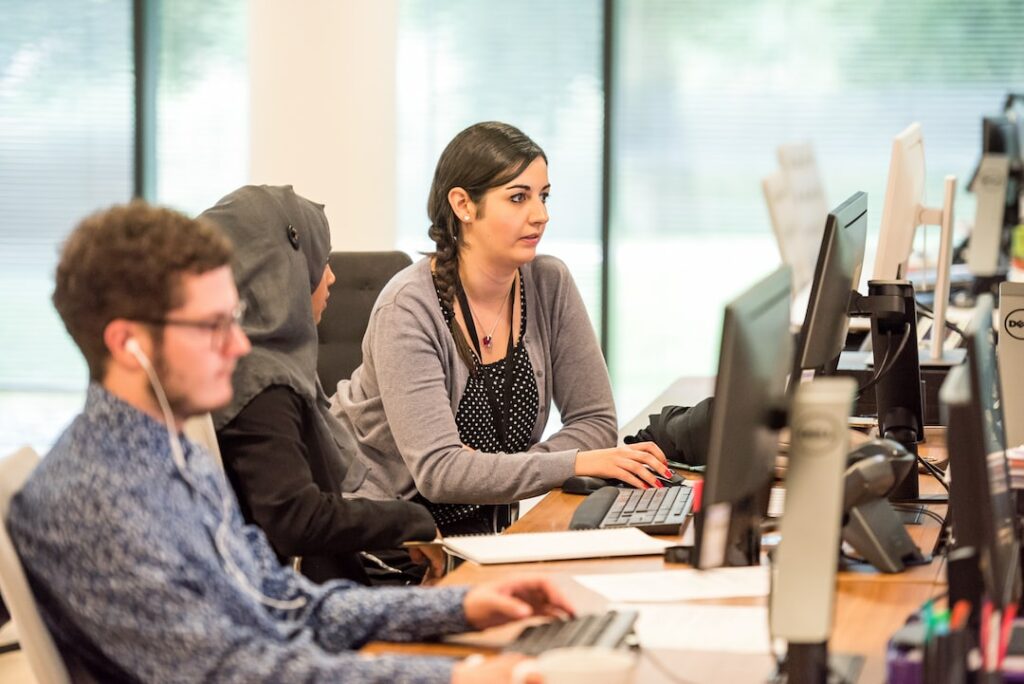
In order to create a truly supportive work environment, it is important for organizations to implement a range of adjustments tailored to meet each employee’s unique needs.
These adjustments may involve changes to physical workspaces, such as providing noise-canceling headphones or ensuring adequate lighting and modifications to work schedules or communication methods.
Additionally, it may be helpful to provide training and education to coworkers and managers to help them better understand and accommodate the needs of neurodiverse employees. These trainings can support managers in creating the right environment so that neurodivergent employees can feel safe in discussing and asking for these accommodations.
By taking these steps, organizations can create an environment that enables neurodiverse individuals to reach their full potential and contribute their unique perspectives and talents to the workplace.
Flexible Work Schedule
Providing neurodiverse employees with flexible work schedules is a highly effective strategy for promoting engagement, focus, and overall productivity. They can optimize their cognitive functioning and perform at their best by tailoring their work hours according to their individual preferences and natural productivity patterns. For many, this has been an added benefit for the recent work from home policies that companies had adopted during COVID.
Doing so can translate into better job satisfaction, enhanced job performance, and improved overall quality of life. Whether it involves adjusting start and end times, allowing for more frequent breaks throughout the day, or other items, flexible work schedules can be an invaluable tool for creating a more inclusive and supportive workplace culture.
Workspace Adjustments
Creating a comfortable and focused work environment can significantly enhance the productivity and well-being of neurodiverse employees. Consider providing workspace enhancements, such as noise-canceling headphones, quiet spaces, or ergonomic furniture, to help them feel more at ease and better equipped to perform their duties effectively.
Assistive Technology
Assistive technology has proven to be effective for employees with different cognitive abilities. By using tools such as text-to-speech software or visual aids, employees can enhance their productivity significantly.
These technologies can help employees overcome challenges and provide them with equal opportunities to perform their job duties efficiently. In today’s world, assistive technology has become essential to creating a supportive and inclusive workplace environment.
Task Management Support
For neurodiverse individuals, managing tasks and staying organized can be a challenge. However, the implementation of task management support tools can be beneficial in addressing these difficulties.
The Leantime project management tool is an excellent example of a platform designed to cater to the needs of employees with ADHD, ADD, and dyslexia. The tool offers a range of features tailored to support them in their work and prioritizes feature development under the lens of cognitive accessibility.
For example, it helps prioritize tasks, set reminders, and track progress and it does so in a way that boosts dopamine and is more attuned to how our brains work naturally. This can lead to increased productivity, improved time management, and better work performance.

Extended Training
Providing extended training and learning opportunities can help neurodiverse employees develop their skills and better adapt to the work environment. The importance of new skills is really important for neurotypes, such as ADHD, that prefer variety, new experiences and skill development.
Employers can offer additional training sessions, which may include specialized courses or workshops designed to meet the unique needs of neurodiverse employees. These sessions can cover various topics, such as communication strategies, time management skills, and problem-solving techniques.
Additionally, employers can provide supplementary materials, such as training manuals or online courses, to supplement in-person training. Personalized learning plans that consider their unique learning styles and areas of interest can also be created. By providing these extended training and learning opportunities, employers can help their employees feel valued and supported in the workplace.
Support System
Creating a supportive workplace environment is essential for their professional growth and well-being. One way to achieve this is to establish a comprehensive support system, including mentorship programs, employee resource groups, and other relevant initiatives.
These programs can help neurodiverse employees feel more connected and appreciated, providing them with the necessary tools and resources to succeed in their roles. Mentorship programs, for instance, can pair them with experienced colleagues who can provide guidance, feedback, and support.
On the other hand, employee resource groups can offer a safe and inclusive space for neurodiverse employees to connect with others who share similar experiences and challenges.
By implementing these initiatives, businesses can foster a culture of belonging and support, benefiting neurodiverse employees and the organization.
Regular Feedback
Regular feedback and performance reviews benefit neurodiverse employees in understanding their work performance. When managers and employers provide constructive feedback, they can focus on their strengths and work on areas that need improvement.
This open communication fosters personal and professional development and promotes a more inclusive work environment where everyone is equally valued and respected.
Additionally, regular feedback and performance reviews can help them to understand specific job expectations better, increase job satisfaction and reduce stress in the workplace.
Encourage Open Communication
Creating an inclusive workplace culture of support can be significantly lessened by establishing and encouraging open communication channels within the organization. By openly expressing their needs, concerns, and suggestions, they can feel empowered and valued, and their unique perspectives can help to promote a more diverse and innovative workplace culture.
Such open communication channels can take many forms, from regular meetings with managers or HR representatives to anonymous feedback systems or employee networks. Organizations can foster a more inclusive and understanding workplace environment that benefits all employees by prioritizing and supporting such communication channels.
Navigating Neurodiversity in Remote Work

As remote work becomes increasingly prevalent, it is essential to address the unique challenges faced by neurodiverse employees in virtual work environments. By making thoughtful adjustments and developing a digital workspace customized to their requirements, organizations can guarantee an inclusive and supportive remote work experience for neurodivergent team members.
Addressing the Unique Challenges of Virtual Work
Remote work can present various obstacles for neurodiverse employees, such as difficulties with communication, time management strategies, and maintaining focus.
One practical approach is establishing open communication channels between managers and neurodiverse employees. This can include regular check-ins, virtual meetings, and feedback sessions. Managers can also provide specific instructions and clear expectations to help employees understand their responsibilities and prioritize their tasks effectively.
Another strategy is offering flexibility in work schedules. They may benefit from a more flexible work environment, such as working outside of traditional office hours or taking breaks as needed. This can help them manage their workload and reduce stress levels.
Adjustments to Remote Work
Today, remote work has become a norm. Though remote work has its benefits, it can also have its challenging for neurodiverse talent to adjust to the new work environment.
Therefore, it is important to make necessary adjustments to remote work to support them just as in traditional work settings. One way is by providing assistive technology that can help them work more efficiently.
Additionally, extended training can help neurodiverse employees understand how to maximize the use of remote work technology. Access to virtual support networks is also crucial as it can provide them with a sense of community and help them feel less isolated.
Also, organizations should ensure that their remote communication and collaboration tools are accessible and user-friendly for employees with diverse cognitive abilities. By making these adjustments, organizations can support neurodiverse employees and create a more inclusive remote work environment.
Maintaining a Digital Workspace
Establishing and sustaining a digital workspace tailored to meet the requirements of neurodivergent workers is a crucial element in promoting inclusivity in remote work. This involves providing task management support and leveraging digital tools.
Leantime is a project management software that offers a wide range of features designed to support individuals with ADHD, ADD, and dyslexia. These features include task lists, time tracking, and project scheduling functionalities that help individuals prioritize tasks, manage their time efficiently, and stay organized.
Additionally, Leantime provides a distraction-free workspace with minimal visual clutter, which helps individuals with ADHD and ADD to focus better.
Did You Know: Research suggests approximately 20% of adult Americans are affected by some form of learning and attention issues. [3]
By utilizing such digital tools and technologies, organizations can foster a supportive and inclusive remote work environment for their neurodiverse workforce. It helps increase productivity and ensures that all employees, regardless of their neurodiversity, have an equal opportunity to succeed.
Cultivate Patience and Flexibility
It can be helpful to remember that your neurotypical colleagues may need a more thorough understanding of neurodivergent experiences. This can lead to misunderstandings or miscommunications in the workplace.
Exercising patience and being willing to answer questions, offer clarification, and adjust your communication style is essential. This can help foster smoother interactions and create a more harmonious workplace environment.
Adopting a flexible and adaptive approach can help ensure that your individual needs are met while working effectively with your colleagues. Remember that everyone has their unique perspective and communication style, and by being open-minded and accommodating, you can help create a more inclusive and supportive workplace culture.
Strategies for Building a Neurodivergent Workforce

Building a diverse team involves implementing greater inclusion, support, and understanding strategies. By employing a range of approaches, organizations can create a more inclusive work environment that embraces their employees’ unique strengths and challenges.
Inclusive Hiring Practices
Developing a diverse workforce that includes neurodivergent individuals is an essential goal for any business. It’s important to implement hiring practices that welcome and accommodate candidates with conditions such as autism, ADHD, dyslexia, and others. It involves redefining recruitment and diversity hiring strategies to attract more diverse candidates and give them equal opportunities to succeed.
Make sure the job descriptions are written using plain language and avoid unnecessary terms. It can help to attract a mixed pool of neurodivergent candidates and reduce barriers to entry for those with learning disabilities or different educational backgrounds.
Read More: Harvard Business Review: Neurodiversity as a Competitive Advantage [4]
Training and Awareness Programs
Developing comprehensive training and awareness programs for all employees plays a pivotal role in developing an inclusive workplace culture.
These initiatives go beyond surface-level understanding, delving into the intricate concept of neurodiversity—the diverse range of differences in the human brain and its functioning. The focus extends to equipping staff with insights into the distinctive strengths and challenges linked with neurodivergent conditions such as autism, ADHD, and dyslexia.
By encouraging an inclusive work environment, organizations create a space where employees not only gain knowledge but also leverage unique skills and a wealth of experiences for collective growth and success.
Aligning Strengths with Purposeful Tasks
Unleashing the full potential of neurodiverse talent involves a personalized approach that starts with recognizing and utilizing their strengths.
Managers play a crucial role by collaborating with neurodiverse team members to identify their strengths, skills, and areas of expertise. By understanding these unique capabilities, managers can tailor task assignments to align with each employee’s strengths, ensuring a more effective and fulfilling contribution to the team’s goals.
This personalized approach not only improves individual performance but also develops a work environment where all employees thrive and make meaningful contributions to the team’s overall success.
Promoting Open and Transparent Communication
Open and transparent communication is vital for employees in the workplace. They allow neurodivergent individuals to express their needs, concerns, or suggestions comfortably. Managers should actively listen and respond to these inputs, fostering a collaborative and responsive environment.
Regular team meetings, one-on-one check-ins, and anonymous feedback mechanisms can contribute to a comprehensive communication strategy that ensures the voices of neurodiverse employees are heard and valued.
Encouraging Team Collaboration and Social Support
Encouraging a culture of team collaboration and social support plays a crucial role. It goes beyond the professional realm, emphasizing empathy, understanding, and unity among team members.
It involves creating spaces for open conversations, team-building activities, and initiatives that promote mutual support. By nurturing a work environment where they feel connected, valued, and supported both professionally and personally, businesses can enhance belonging, teamwork, and overall workplace success.
Challenges and Solutions in Managing a Neurodiverse Workforce

It has its own set of unique challenges and opportunities. By understanding these challenges and implementing effective solutions, organizations can create a more inclusive and supportive work environment for all employees.
Overcoming Social and Communication Barriers
Employees may face difficulties in social interactions and communication, which can impact their workplace experience. Organizations can offer targeted training programs to address these challenges to improve social skills, foster team-building activities, and promote open communication channels within the team.
This approach can help existing employees overcome social and communication barriers while also fostering a collaborative and inclusive work environment for neurodivergent individuals.
Adapting Recruitment and Interview Processes
Traditional recruitment and the hiring process can be challenging, often leading to unintended discrimination. Organizations can adapt these processes by using inclusive job descriptions, offering alternative assessment methods, and providing support during job interviews.
With these adjustments, employers can make sure that their recruitment and hiring managers are more accessible and welcoming to candidates. It can help improve the interview process.
Various organizations, agencies and programs are available to help employers source and hire neurodivergent workers.
Supporting Well-Being and Work-Life Balance
Neurodivergent employees, like all workers, benefit from a supportive work environment that promotes well-being and work-life balance. Employers can achieve this by offering flexible work arrangements, providing mental health resources, and encouraging a culture of empathy and understanding. By prioritizing employee well-being, organizations can create a more inclusive and nurturing workplace for neurodiverse employees.
Educating Team Members
Managing such a workforce can be a challenging task that requires understanding the unique strengths and challenges of neurodivergent individuals. One of the most important aspects of successfully managing such a team is to nurture a culture of empathy, understanding, and inclusion. This can be achieved by providing education and awareness programs that help all team members understand and appreciate the value of neurodiversity.
When team members are educated, they can learn to recognize and appreciate their colleagues’ unique strengths and abilities. This can help create a positive and supportive work environment that encourages collaboration.
Supporting neurodiversity in the workplace can also lead to improved creativity, innovation, and critical thinking. They often bring a unique perspective to the table, which can lead to fresh ideas and new solutions to problems. When organizations embrace and leverage the strengths of all their team members, they can unlock the full potential of their workforce and achieve greater success.
Leantime: Supporting Neurodiversity in the Workplace
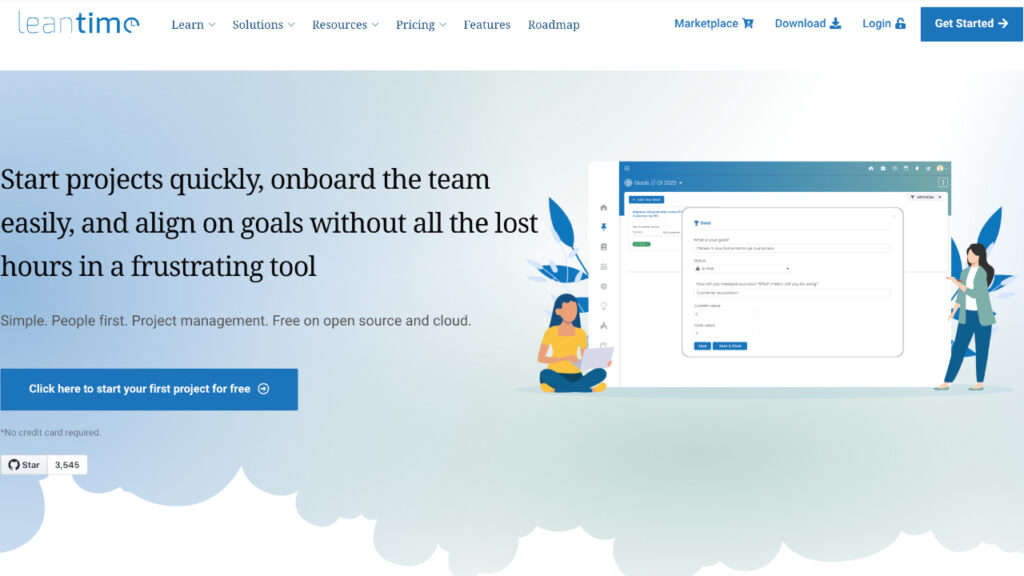
In today’s diverse and inclusive work environments, Leantime plays a crucial role in supporting neurodiversity. As an inclusivity-focused project management tool, Leantime is designed with the unique needs of neurodivergent employees in mind, catering to individuals with dyslexia, ADD, and ADHD.
By offering features that enhance work engagement and motivation, Leantime provides a user-friendly experience for diverse team members and helps create a supportive workspace for all.
Inclusivity-focused Project Management Tool
Leantime emphasizes an inclusive project management approach, aiming to empower neurodivergent employees to make meaningful contributions to their teams and reach their full potential. Including features tailored to the specific needs of neurodivergent individuals, Leantime fosters a more inclusive and supportive work environment for everyone.
A study by Hewlett Packard Enterprise found neurodiverse teams are 30% more productive. [5]
Features Designed for Individuals with ADHD, ADD, and Dyslexia
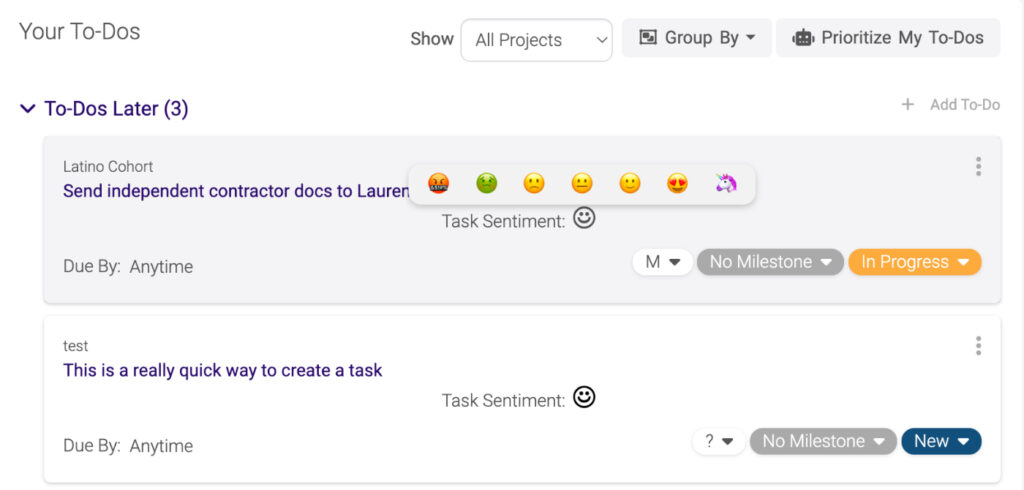
Recognizing the unique challenges faced by individuals with ADHD, ADD, and dyslexia, Leantime offers specialized features that cater to their cognitive needs. These features promote focus, engagement, and organization, enabling the neurodivergent employee to maximize their productivity and contribute to their team’s success.
One example of this within Leantime is through the ability to rate tasks on an emoji rating scale. Along with their task prioritization feature, their AI will also take into account how you feel about the work you’re doing. In the future, they report building a feature that will recommend to project managers who to assign tasks to based on how they feel about the work.
Enhancing Work Engagement and Motivation
Leantime’s inclusive design also aims to enhance work engagement and motivation for all employees, including those with neurodiverse conditions. By implementing research-based strategies and leveraging AI-based tools, Leantime helps foster a more engaging and rewarding work experience for every team member.
User-friendly Experience for Diverse Team Members
Leantime offers a user-friendly experience that caters to diverse team members, ensuring that everyone can effectively use the tool to manage their projects and collaborate with their colleagues. Other tools typically require you to think about how to set up your tools and develop a process. This can be overwhelming for people in general but more so with neurodivergence. With Leantime’s built-in workflows, it’s easy to jump right in to organizing the work.
By prioritizing accessibility and ease of use, Leantime promotes a more inclusive and supportive work environment for neurodiverse talent.
Unlocking Neurodiverse Potential
Welcoming neurodiversity in the workplace is essential for fostering creativity and innovation capabilities. By implementing effective strategies and support groups for neurodivergent employees, organizations can create an inclusive and supportive environment that allows everyone to thrive.
Leantime is a project management tool that is created with inclusivity in mind. It is a powerful tool that offers a range of features that are specifically tailored to meet the needs of neurodivergent individuals who are diagnosed with Attention Deficit Hyperactivity Disorder (ADHD), ADD, and dyslexia.
These features are designed to enhance work engagement and motivation, making it easier for individuals with diverse cognitive abilities to stay focused and productive.
Moreover, Leantime provides a user-friendly experience that is accessible to all team members, regardless of their neurological differences, ensuring that everyone can work together effectively and efficiently.
Resources
[1] Doyle N. Neurodiversity at work: a biopsychosocial model and the impact on working adults. Br Med Bull. 2020 Oct 14;135(1):108-125. doi: 10.1093/bmb/ldaa021. PMID: 32996572; PMCID: PMC7732033.
[2] VERCIDA. (n.d.). J.P. Morgan Autism at work. View Resource
[3] Bureau, U. C. (2023, June 26). The South Had Highest Disability Rate Among Regions in 2021. View Resource
[4] Austin, R., & Pisano, G. (2017, July 18). Neurodiversity Is a Competitive Advantage. Harvard Business Review. View Resource
[5] MyDisabilityJobs. (2022, August 9). Neurodiversity in the Workplace | Statistics | Update 2022. View Resource



